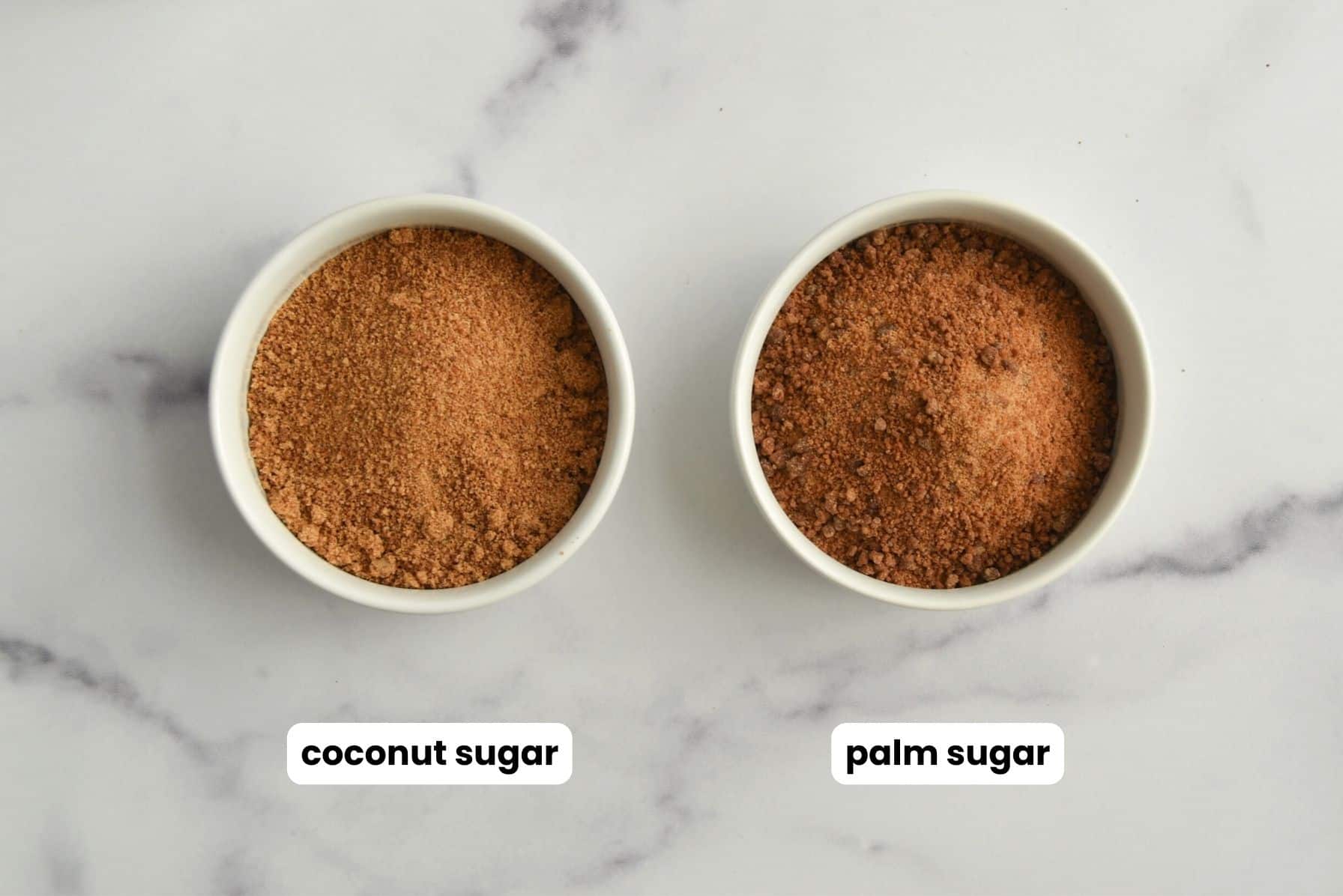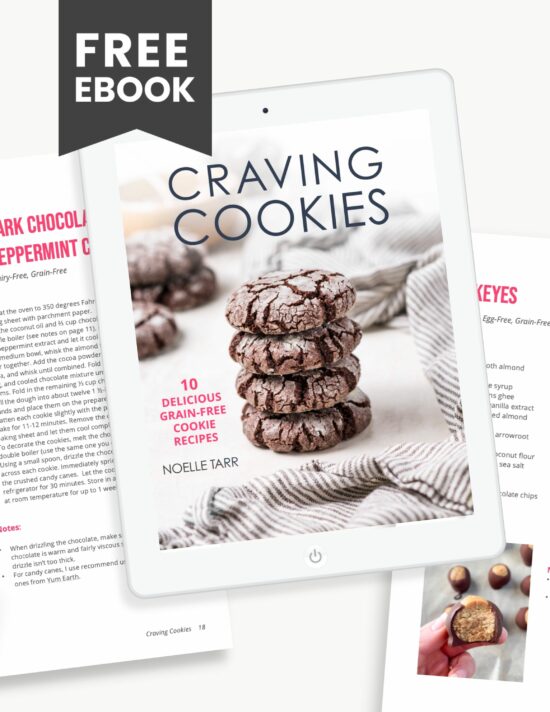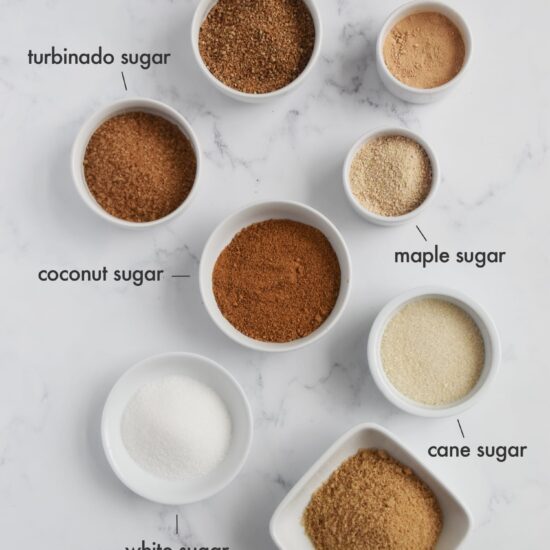This post may contain affiliate links. Please read our disclosure policy.
Confused about the difference between coconut sugar vs palm sugar? Here’s how they are different, and which one you should be using in cooking and baking!

When it comes to sugar, there’s an endless variety to choose from. Sugar is typically extracted from sugar cane or sugar beets. But, there are many other varieties of sugar, and both coconut sugar and palm sugar have grown in popularity over the last few years.
While the names are often used interchangeably, coconut sugar and palm sugar are actually extracted from different sources. This has led to a lot of confusion among consumers—and rightly so! To help you know which one to buy and use in recipes, here’s everything you need to know about coconut sugar and palm sugar.
Jump to:
Difference Between Coconut Sugar vs Palm Sugar

While often used interchangeably, the main difference between coconut sugar vs palm sugar is where they are extracted from. Coconut sugar is extracted from the sap of flowers on the coconut palm tree, whereas palm sugar is extracted from the sap of palm trees, specifically the trunk.
Another big difference? They both vary in taste and texture! Coconut sugar has a lovely smooth butterscotch flavor, whereas palm sugar tends to have a smokier caramel flavor. Both are less sweet than white or granulated sugar and contain naturally occurring nutrients and inulin.
What is Coconut Sugar?
Coconut sugar is made from the sap of the flowers on the coconut palm tree. Despite the name, it doesn’t come from coconut, rather it comes from flower bud stems on coconut palms.
Coconut sugar is made by cutting the flower of the coconut palm and collecting the liquid sap. Then, the sap is placed under heat to evaporate the water. Afterwards, the dried sap is broken apart, which results in a granulated caramel-colored sweetener. When it comes to look, taste, and texture, it is very similar to brown sugar.
What is Palm Sugar?
Palm sugar comes from the sap of palm trees, specifically the trunk of the tree. It can be sourced from many different types of palm trees, including date and sugar palms. Once the sap is extracted, it’s boiled down. This can be sold as palm syrup, or solidified into rock-like chunks of sugar and broken apart, which creates granulated palm sugar. It can range from golden brown to dark brown in color.
Buying Tips
If you’re utterly confused by the all the names you’re seeing for natural sugars—you aren’t alone! Early on, I didn’t understand why coconut sugar was often called coconut “palm” sugar. Was exactly was this?
But, here’s the deal: when it comes down to it, there is no difference between coconut sugar and coconut palm sugar. Both are extracted from the sap of the coconut palm tree, which is a specific type of palm tree. Palm sugar, on the other hand, comes from the trunk of palm trees. Some companies have incorrectly labeled coconut sugar as coconut palm sugar, which has caused some confusion among consumers. When it comes down to it, both of them are the exact same product.
Is Coconut Sugar Healthy?
Coconut sugar is a natural alternative to other sugars because it’s minimally processed and maintains vitamins and minerals. It contains many nutrients, including iron, zinc, calcium, and potassium, as well as polyphenols and antioxidants.
It also contains inulin, a prebiotic fiber that may slow glucose absorption. It’s still sugar, and is almost identical to regular sugar in terms of calories and carbohydrate content.
Choosing the Best Option For Recipes
Head to the grocery store, and you’ll find many different types of sugar to choose from. The most popular varieties include granulated (table) sugar, brown sugar, and cane sugar. The good news is, there are many less refined alternatives that can be used in recipes, including coconut sugar, palm sugar, maple syrup, honey, and more!
Ultimately, the type of sugar you use will depend on the flavor you want to achieve. When it comes to choosing between coconut sugar vs palm sugar, I find coconut sugar to be the best option when it comes to flavor and consistency. It’s lightly sweet with hints of caramel and the flavor is fantastic in breads, cakes, and puddings.
Substitutions
You can substitute coconut sugar for palm sugar and vice versa. They are virtually the same when it comes to the level of sweetness, texture, and flavor. Palm sugar is a bit smokier, so I recommend coconut sugar for most desserts and baked goods.
Baking Tip
Over the years, I’ve used many different brands of coconut sugar and have found that some dissolve better than others. Make sure to mix it in with the wet ingredients, and test a few different brands to see which one works best for your recipes! I really love this brand as it dissolves really well and isn’t grainy in cookies and breads.
Recipe Ideas
I love using coconut sugar in healthy desserts recipes, sauces, and sautés! Here are some of my favorite recipes:
- Healthy Baked Orange Chicken
- Paleo Chocolate Banana Bread
- Dairy Free Chocolate Pudding
- Paleo Chocolate Cake
- Healthy Carrot Cake
Conclusion
Coconut sugar and palm sugar have a similar consistency, nutrient profile, and flavor. While the difference between the two is fairly simple, knowing how to use them can make all the difference when purchasing the right product!
Have a question about a specific brand? Let me know in the comments below!



